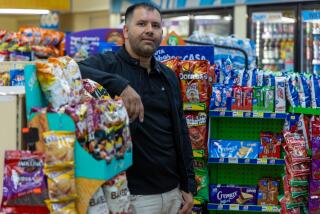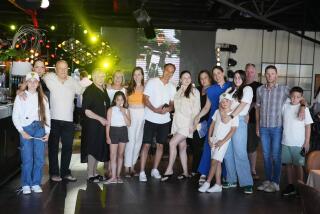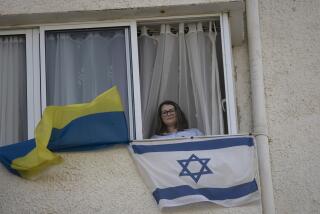SOUTHERN CALIFORNIA AND THE PERSIAN GULF CRISIS : Baby, Family Beat Odds in Escape From Kuwait to U.S.
- Share via
SAN DIEGO — The Chihwaro family, U.S. citizens living in Kuwait City, bluffed their way past Iraqi border guards, endured two days jammed into a subcompact car and made do with only bread and cheese in the 800-mile journey to Syria.
But it was their baby daughter Miriam, wrapped in red tape almost as surely as in a diaper, who stopped their flight back to the United States. Born in the confusion after Iraq’s invasion of Kuwait, she had no birth certificate and thus could not be allowed into the United States, her parents were told at the U.S. Embassy in Damascus.
On Wednesday, a month after reaching Syria, the Chihwaros landed in San Diego to the teary-eyed jubilation of a dozen relatives who used stateside help to get them out of Syria.
“I can’t believe she stayed alive,” Georgette Chihwaro said of her six-week-old daughter. “She’s OK. She’s a good girl.”
Raymond Chihwaro said the family, natives of Lebanon, spent 25 days hiding at home after the invasion. Their only foray outside was for Miriam’s birth in a Kuwait City hospital Aug. 14. On Aug. 26, they fled.
“We left at the right time, because they had closed the border for a couple of days, and we moved immediately when they reopened,” Chihwaro said. “We used papers saying that we belong to Lebanese nationality.
“It was a small Japanese car, and six or seven people stuck in the car. I had my 4 1/2-year-old son (Allan) sitting on my lap for . . . the whole trip.”
But, once in Syria, their worries weren’t over.
“The birth was not documented. Therefore, the State Department could not document that it was their child,” said Blanca Sauermann, immigration caseworker for Rep. Jim Bates (D-San Diego).
So their relatives--Chihwaro’s two brothers and a sister and their families--knew they had to help.
“I called everywhere at the State Department,” said brother Razallah Chihwaro, who owns a hair salon and a deli in downtown San Diego. “The State Department was very helpful, but there are so many people who have the same circumstances so they really cannot do anything about it.”
Finally, an appeal to Bates’ office helped resolve the problem. Within 24 hours, the State Department had the necessary clearance.
Sauermann said she handles 25 to 100 immigration cases a week, but “this one was unique, because she’s the youngest little victim I’ve ever come across. For something like this to happen to a baby so young, it’s bizarre. It’s a one-in-a-million type of case.”
Exhausted, her face pale, Georgette Chihwaro begged off talking to reporters at the airport. “Maybe tomorrow,” she said.
Shyly and with his eyes gradually misting over, her son, Norman, 9, said that mostly he was not scared. But he remembered the time when the gunfire came close. It was on the day Miriam was born, Norman said.
“That was the day they started hitting, when she was born,” he said. “They hit at the palace. There was nobody inside, but we thought it was coming somewhere near our house. So we stayed by the door, ready to run out.”
Raymond Chihwaro, an architect employed by the Kuwaiti public works ministry, said he will look for a job in San Diego. All their money and belongings were left behind, so they’ll be with relatives in Spring Valley for a while, he said.
“All I care about is that we’re safe,” he said. “Everybody asks, ‘How about your money? How about your belongings?’ I don’t care. We’re safe. That’s all that I care about.”
More to Read
Sign up for Essential California
The most important California stories and recommendations in your inbox every morning.
You may occasionally receive promotional content from the Los Angeles Times.












